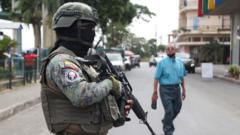The ongoing gang warfare in Cape Town's Cape Flats has devastated families, as innocent victims like four-year-old Davin fall prey to the violence. Despite efforts at rehabilitation and violence interruption from community leaders, generations are caught in a cycle of crime and tragedy, leaving many without hope for the future.
Gang Warfare's Toll: The Human Cost of Cape Flats Violence

Gang Warfare's Toll: The Human Cost of Cape Flats Violence
Exploring the tragic impact of gang violence in Cape Town's Cape Flats, as families endure unimaginable loss amid systemic issues.
In Cape Town's beleaguered Cape Flats, the specter of gang violence looms large, claiming innocent lives and devastating families. The tragic story of four-year-old Davin Africa, who was shot dead earlier this year, exemplifies the horrifying toll of this ongoing conflict. Davin’s father, Devon, can still point to the bullet holes in their home, a stark reminder of the chaos that shattered their lives. Just two years prior, Davin’s sister Kelly Amber, aged 12, was also lost to the violence, an unspeakable double tragedy for this family.
The legacy of apartheid continues to perpetuate gang warfare in this area, as those previously marginalized have been forced into under-resourced neighborhoods rife with violence. Despite police claims of increased patrols, gang-related murders remain alarmingly high in the Western Cape, where criminal organizations flourish due to systemic neglect by the state. These gangs provide a twisted sense of order, offering essential services where the government has failed, making them deeply embedded in community fabric.
In the nearby township of Hanover Park, Pastor Craven Engel works tirelessly to mediate conflicts and seek peace among gangs. With limited economic opportunities, many community members are drawn into the lucrative drug trade, leading to a cycle of addiction and violence. Pastor Engel's programming aims not just to intervene but to change mindsets, with rehabilitation funds from charitable donations being vital for those wanting to escape gang life.
While Pastor Engel faces numerous challenges—children as young as eight being recruited into gangs and retaliatory killings decimating any semblance of peace—he is undeterred, negotiating ceasefires and striving for a safer environment. The futility of a solely police-focused solution is evident as arrests often lead to younger members filling the void. The local community expresses a deep-seated mistrust of law enforcement, complicating efforts for collaboration.
The narratives surrounding gang life shed light on the harsh realities faced by young men like Fernando "Nando" Johnston, who expresses a desire to depart from the gang lifestyle he was born into. With Pastor Engel's support, he now engages in a six- to 12-week rehabilitation program aimed at fostering a new path away from violence. This rare glimpse of hope contrasts sharply with the despair felt by families like the Koopmans, who continue to navigate the trauma of loss amidst an unending cycle of violence.
As communities grapple with the consequences of systemic neglect, Pastor Engel underscores a pressing truth: no external savior will come, and change must arise from within. The struggle for a peaceful and prosperous existence in the Cape Flats is ongoing, and resilience remains both a challenge and a necessity for those caught in the crossfire.




















